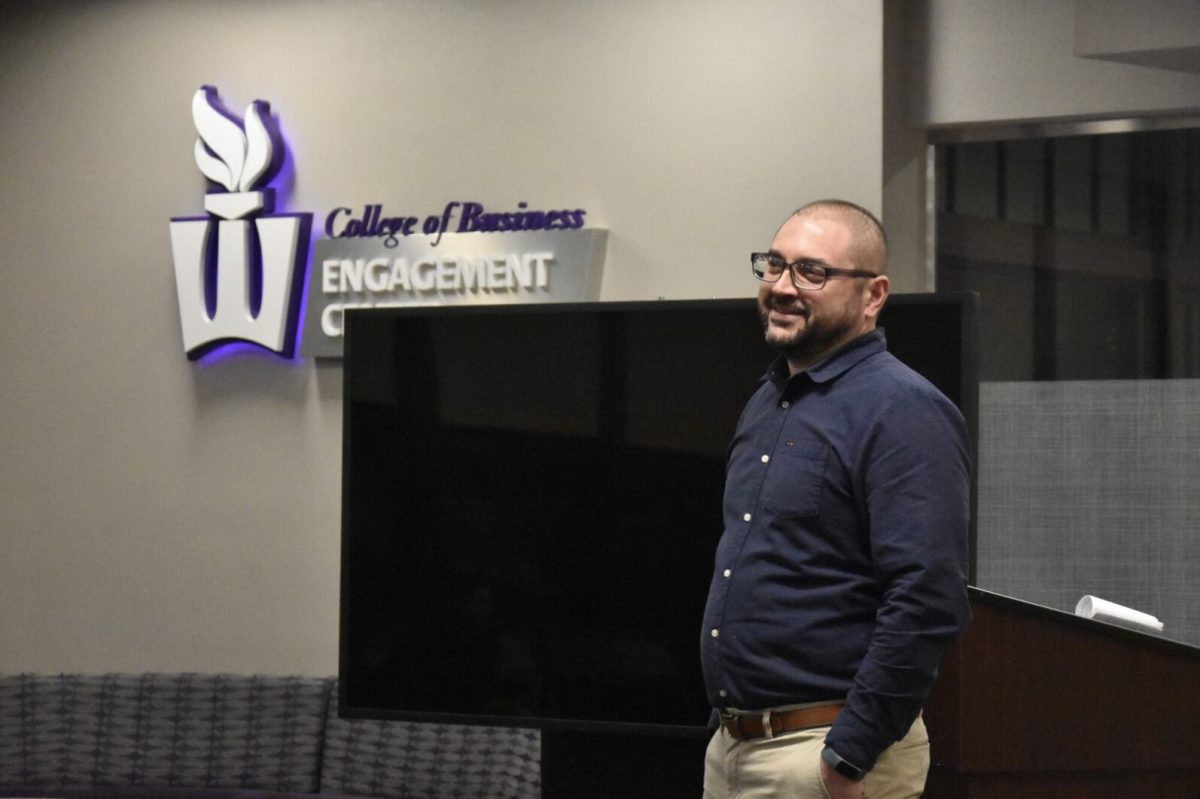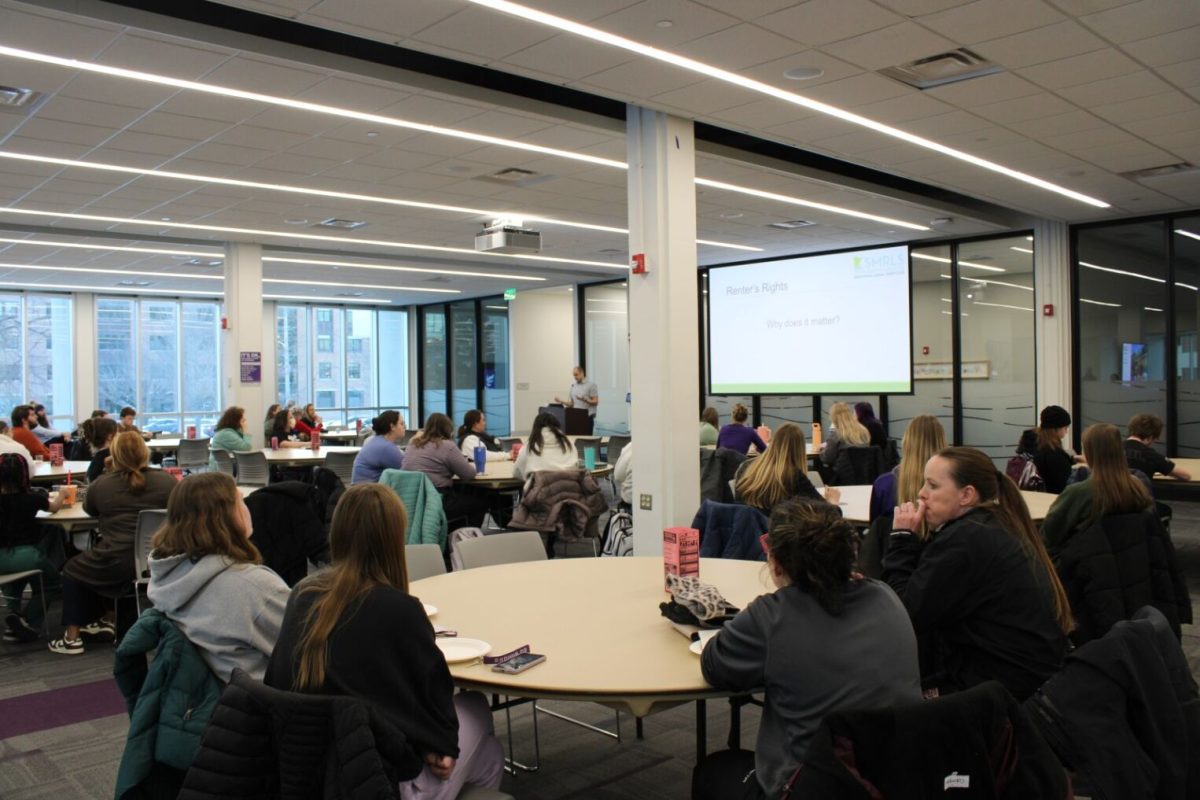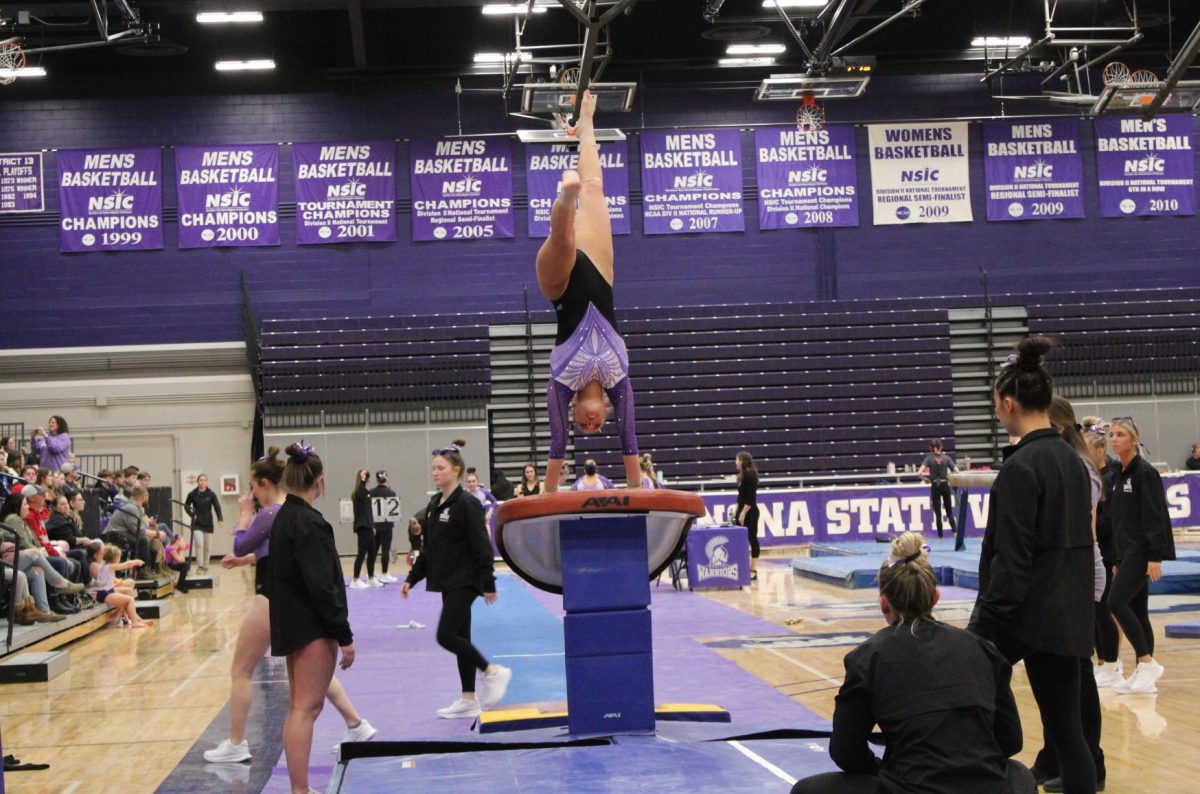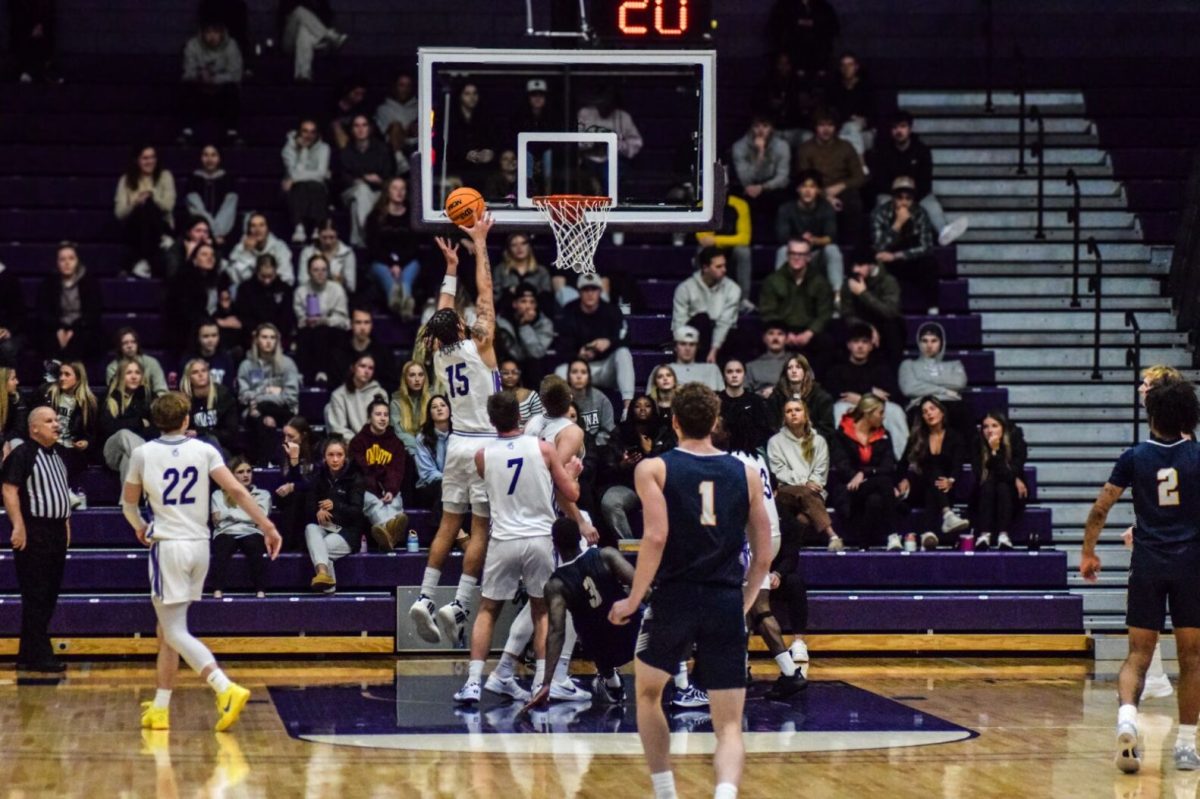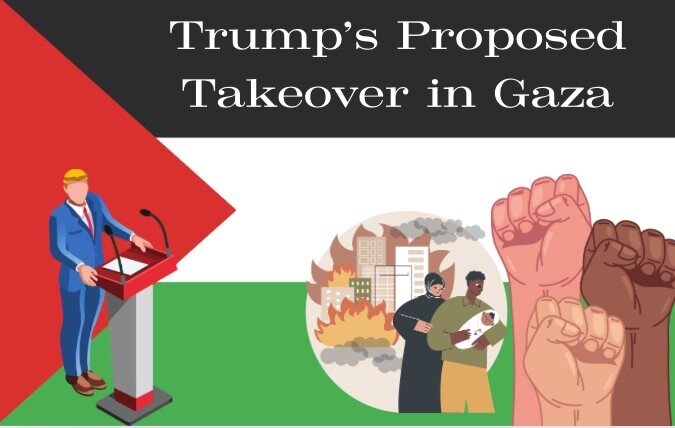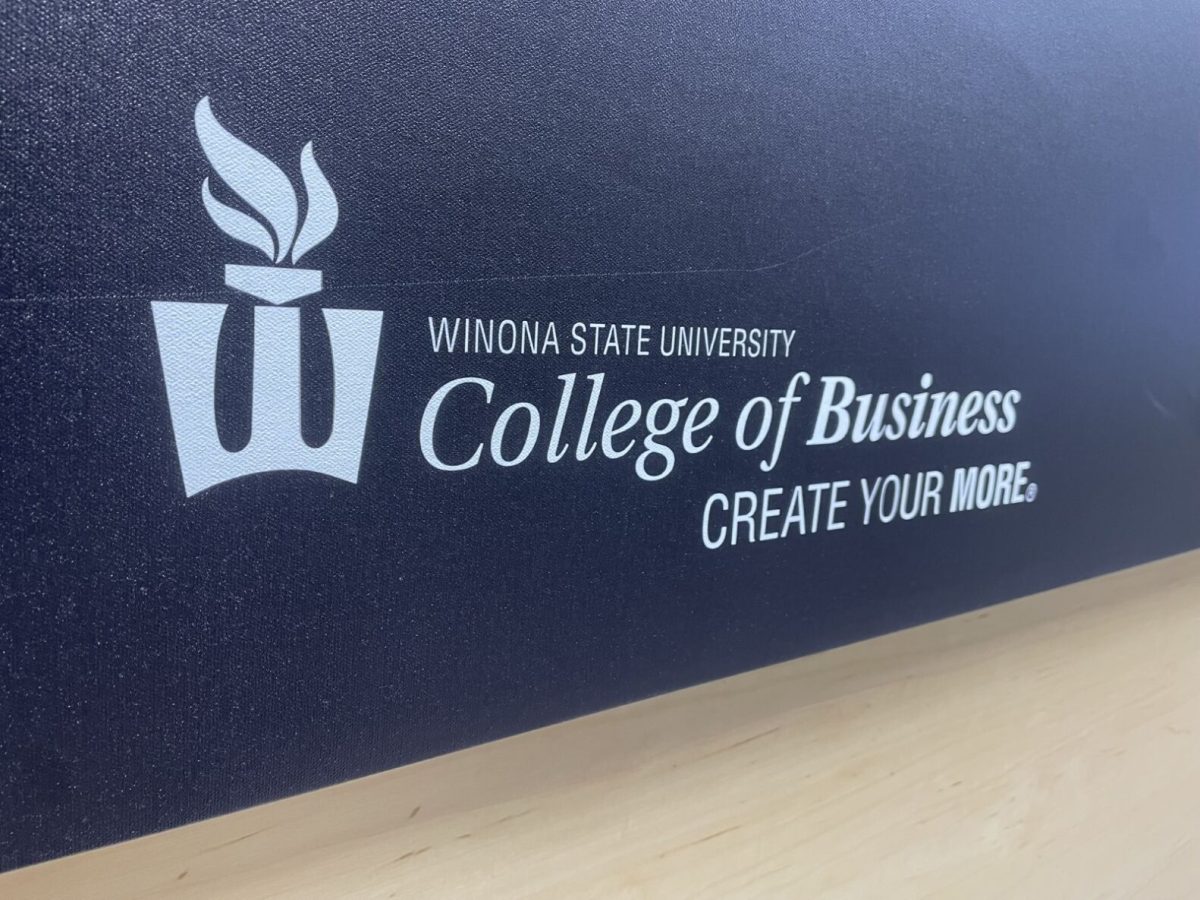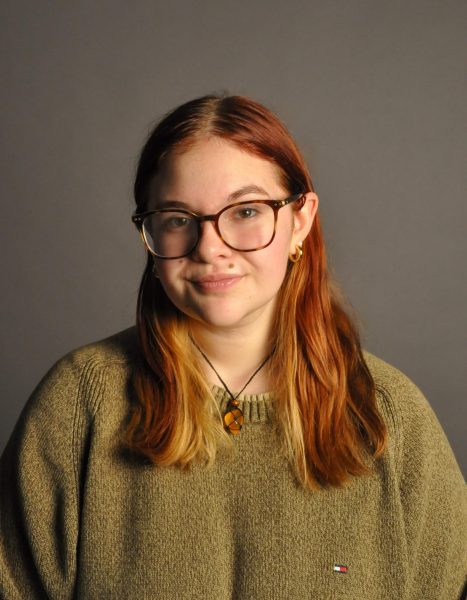Stark Hall homed a talk with Dr. Heidi Morrison on her book written in collaboration with scholars in Gaza called Lived Resistance Against the War on Palestinian Children. The talk on Oct. 28 opened with Women’s, Gender, and Sexuality Studies professor Dr. Mary Jo Klinker as they introduced Morrison from UW-La Crosse and Lama Yahya who joined the talk over Zoom from the West Bank.
The book, which has been in the making for about seven years, has made its way to classrooms like Winona State University. With support from the WGSS department, talks like these are possible for any student, faculty, or community member to attend.
At the beginning of her talk, Morrison highlights findings from historian Peter Stearns that it has been estimated that 150 million children have been killed in wars and purported civil wars around the world since the 1970s. This number has risen as more and more children who equate to one-half of the population in Gaza have been heavily affected and uprooted by Israeli forces.
“If you’re here to hear about Palestinian children, children in a part of the world that may seem very far away but to which we’re very much connected. When I was doing research in the West Bank in Palestine, one of the people I was interviewing, a young man told me, ‘Professor Morrison, you’re going to go back to the United States, you’re going to use all this research, you’re going to get a promotion, you’re going to advance in your career, and yet if you come back here, any time, you’re going to find me still sitting here smoking my cigarette, waiting to be killed by Israel’,” Morrison said. “And you know what? You’re right. Here I am, with a book out, talking to you and there he is still there in the West Bank, waiting for either the next bomb to drop or waiting for the next raid into his hometown by the Israeli forces.”
Morrison comments the book couldn’t be any more relevant than it is today and she decided to make it years ago because children play a role as political actors and with that, they have the power to create change.
“The larger backdrop to which I’m talking is the 20th and 21st century historical phenomenon of adults conducting wars against children,” Morrison said. “One in five children today are living or fleeing from conflict zones. That’s 400 million children…There’s no safe place for children in Gaza. No access to clean water and very little access to food, fuel, and medicine.”
Morrison commented that she comes to this talk to speak with the awareness not to make a profit from this position she is in as an author.
“I speak to you from a place of privilege, I’m in a space that he cannot be. And as such, I recognize that and I speak because I’m trying to amplify the voices that I heard when I was in Palestine, to share what I bore witness to, and to let Palestinians know that they do not stand alone, that they have friends even in the United States.” Morrison said.
All the proceeds from any talk or book sales Morrison hosts, she puts these profits to support scholars in Gaza. She moves further into the contents of the book and explains the main topics the book explores surrounding Palestinian children.
“The essential question to ask is not if Palestinian children are resisting, but how they’re resisting. And what these articles find when we tie them all together in this book is that Palestinian children have a will to survive and demand the end of Israeli oppression,” Morrison said. “How do they do it, the book asks? The book says they do it in large part by relying on what they have, their bodies. In body, in mind, and in flesh. The book talks about something called lived resistance.”
Morrison directs the audience’s attention to the projected screen as she explains that purposeful and lived resistance is the process where people purposely resist through their bodies. She continued to explain the effects of children growing up through constant stages of war.
“Targeting children is very strategic, and it can be done through this outright killing, it can be done through rhetoric, and it can also be done through trauma. It’s done through a process of what another scholar calls ‘unchilding’,” Morrison said. “You take away the childhood of generations of children. It’s a way of eliminating the future…[Children] need to know the world is a good place.”
Morrison comments that humanitarian aid is much needed for affected children but it ultimately is not the solution.
“Oftentimes when [aid] comes in the form of mental health care workers, they come in with these Western diagnoses and put them on these children. And that makes the children feel as if their reaction is not normal, but instead a diagnosis,” Morrison said. “A State of the Child report in 2022 said that 3 out of 5 [children in Gaza] were self-harming. That’s the highest rate in the world.”
In addition, Morrison explains children also face a term called ‘scholasticide’ which is the killing off and destruction of all the educational infrastructure that is happening in Gaza.
“Every child in Gaza right now has had their education disrupted…Educators have been killed off and universities destroyed. This has interrupted the access of children to education and the transfer of knowledge,” Morrison said. “When you disconnect a whole generation from their sources of knowledge, their teachers, the generational knowledge, you’re trying to kill off that generation.”
After concluding Morrison’s presentation on the book, she invites Yahya to speak on her work done at the beginning of the book.
“My contribution to this book did not involve authoring a chapter like it did for the rest of the Palestinian authors who contributed with a chapter to the book, rather I facilitated and translated the piece that came out of these two young ladies in their collaboration with Dr. Heidi Morrison.”
From a long line of committed activists, cousins Janna Jihad and Ahed Tamimi are from a village in the West Bank called Nabi Saleh. Using her mother’s iPhone to document the violence inflicted by the Israeli army on her village, Jihad began her reporting career at the age of nine.
“In Nabi Saleh, they used to have a weekly demonstration against the route of the separation wall which cut through their village and separated the village from the water source,” Yahya said. “As Janna recorded the violence inflicted by the army on the weekly peaceful protests that were happening in her village, her primary goal was not to highlight the experiences of children exposed to such violence, but her work ended up inevitably providing a vital perspective on this issue.”
Tamimi gained international attention following an incident in 2017 when she was filmed confronting a soldier in self-defense after the army shot her 14-year-old cousin in a protest and invaded her home.
“Ahed slapped the soldier and this was recorded…and the video went viral. Subsequently, Ahed was arrested during a nighttime raid on her family’s home. At the time, Ahed was just 16,” Yahya said. “The experiences of Janna and Ahed embody the concept of ‘unchilding’, which is discussed extensively in this book, which is defined as a process that deprives Palestinian children of the opportunity to grow up in safety, subjecting them to systematic and political violence that undermines their childhood. While Ahed’s life reflects the victimization of Palestinian children, it also embodies their resilience and resistance to oppression.”
Yahya continued and said “When one person invited Janna and Ahed to reflect on children’s resistance in Palestine, they chose to address a more fundamental issue. Rather than detailing specific political actions or resistant battle tactics, they articulated their long-denied right to exist and thrive as Palestinian children.”
Despite facing various forms of violence in their most intimate spaces, Yahya said Janna and Ahed advocate for overcoming the fear imposed by the occupation.
“Ahed’s upbringing instilled in her the understanding that true insecurity arises not from resistance, but from compliance with the oppressors. Her most significant contribution to Palestinian resistance may well be her refusal to live in fear.” Yahya said. “Both Janna and Ahed view their very existence on this land as a form of resistance. They recognize that confronting the multiple expressions of the occupation and manifestations of colonialism is both a duty they owe to their country and a right owed to humanity. Refusing to be viewed as victims, Janna and Ahed do not seek pity. Rather, they identify themselves as freedom fighters, advocating for one of the most just causes in the world.”
In an open discussion Morrison and Yahya answered questions from the audience. One of the questions from a Winona State student asked what a student can do other than taking up space to show activism and support for people affected in Gaza.
“It’s not easy to figure out what we should be doing as humans watching this genocide happen live-streamed on Instagram and TV channels. It’s not easy to know what to do, even for me as a Palestinian. I live in the West Bank and for those of you who are familiar, the West Bank is completely separated from Gaza, so I’m going to work on a daily basis. Obviously, I have internet to talk to you guys, I have electricity, I have food, and I can sleep in my own bed. There’s a roof over my head and it kills me just to think that I have hot water,” Yahya said. “I can shower whenever I want to and there are people, my people, who are living just a few hundred kilometers away from me who have no electricity and have no food. They haven’t eaten one hot meal that filled them up, they haven’t had one long shower, they haven’t had electricity. They don’t have their homes, they’ve lost family members, they’ve lost limbs. It’s not easy for anyone to tell anyone else what to do.”
While Yahya does not speak or represent Palestine as a whole, she advocates for people who protest in support of those who are directly affected by policies or institutions that they oppose. She comments that in the US, the voices of people who don’t directly experience the oppression they contest are important to maintain and continue free speech.
“We don’t need anyone to come and fight our fight, the Palestinians’ fight,” Yahya said. “You’re seeing what’s happening on university campuses in the US and the silencing of critical voices and there’s this claim of freedom of speech in the United States that you guys are unable to practice and especially at universities…Fighting what’s happening in your own backyard will indirectly help Palestine and help Palestinians.”



